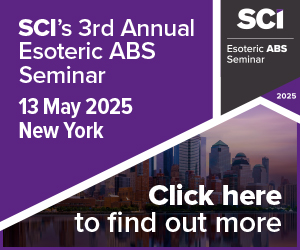.jpg)
Final SEC "conflict of interest" ruling offers crumbs of comfort
The SEC’s final “conflict of interest” ruling, designated Rule 192 and released at the beginning of this week (SCI 29 November), waters down some of the most onerous restrictions but still represents a serious imposition for securitized markets participants, say those in the field.
The new rule prohibits so-called “securitization participants” from engaging in “conflicted transactions” during the life of an ABS deal. Such transactions include short sales of the ABS, credit derivative trades, or – in a change to the original proposed rule released in January – other transactions that are economically equivalent to shorting the ABS or the outcome of the CDS.
“As directed by Congress, today’s rule prohibits securitization participants - including those who sell or facilitate the sale of an asset-backed security - from engaging in transactions that involve or result in any material conflict of interest with investors in that ABS,” said SEC chair Gary Gensler.
These are material burdens, but the SEC has apparently listened to market criticisms voiced loudly in the last ten months and altered some key provisions. Specifically, the definitions of “securitization participants” and “conflicted transactions” have been narrowed, so that, for example, risk-mitigating hedging is now exempted from “conflicted transactions”.
A “securitization participant” is also now more tightly defined so that it only applies to an affiliate or subsidiary if it acts in coordination with a sponsor, underwriter, initial purchaser or placement agent, or has access to or receives information about the ABS or its asset pool prior to the first closing of the sale.
Nonetheless, this new classification is still “way too broad,” considers Stuart Litwin, co-head of Mayer Brown’s securitization practice in the US. It can still be applied to any affiliate or subsidiary that has access to the prospectus, news reports or rating agency presale reports about the ABS, for example. The industry may continue to press for a further tightening of the definition of “securitization participant.”
On the plus side, the SEC seems to have taken a comparatively lenient line with synthetic securitizations. The latter are not prohibited, and the hedging exception no longer only applies to the securitization business of the “securitization participant.” In its note on this aspect of Rule 192, Mayer Brown writes, “We expect that this will allow synthetic securitizations of previously securitized portfolios and ABS financings of portfolios that previously were reference portfolios in synthetic securitizations.”
In addition, the new rule now offers a safe harbour provision if the ABS trade is not issued by a US entity - another key victory.
But the SEC’s current definition of “securitization participants” and “conflicted transactions” continues to exceed that intended by Congress when the Dodd-Frank Act – the origin of this rule – was passed in the wake of the 2008/2009 financial crisis, say its critics.
The one Republican member of the SEC’s five-person commission voted against the rule.
Market observers claim to be neither disappointed nor pleased with the final rule. "It’s about what we expected. There is much improvement over the original proposal, but it’s not a perfect rule,” says Litwin.


